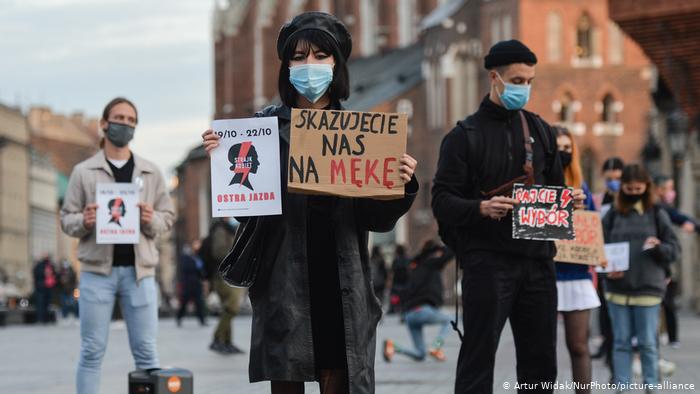
Autores Otávio Rauen e Ana Reis
No dia 22 de outubro de 2020, a Corte Constitucional Polonesa decidiu criminalizar o direito ao aborto em recorrência de deficiências graves na saúde do feto, até então, assegurado pela constituição. Com a decisão, a interrupção da gravidez seria legalizada em apenas dois casos: quando apresentar risco de vida à mãe ou resultar de um estupro ou incesto. (AP, 2020; CBS NEWS, 2020; SKY NEWS, 2020)
A decisão foi apoiada pela Igreja Católica e pelo governo ultra conservador, que tem adotado políticas duras contra as mulheres e a agenda de gênero. Em diversas ocasiões, o presidente Andrzej Duda se manifestou explicitamente contra o aborto legal em situações em que a criança tenha síndrome de Down e em que a vida da mesma não esteja em risco. A declaração não foi por acaso, já que, aproximadamente 98% dos abortos legais efetuados em 2019 foram decorrentes de má formações ou deficiências fetais, de acordo com o Ministério da Saúde da Polônia, (CNN, 2020; BBC NEWS, 2020, CBS NEWS, 2020; SKY NEWS, 2020)
Apesar de agradar grupos mais conservadores, a retirada de parte dos direitos reprodutivos constitucionais das mulheres foi recebida com muitos protestos por parcela significativa da população. As praças e ruas de toda Polônia foram tomadas por manifestações crescentes e repercutiram nas principais cidades europeias, mas não somente, já que ganharam apoio também nos Estados Unidos. Dentro desse momento de revoltas e protestos, as pessoas estão indo às ruas para se opor ao atual governo por suas atitudes eurocéticas, protecionistas e nacionalistas. É importante ressaltar que a legislação polonesa sobre aborto, junto da maltesa, é uma das mais restritas em toda a União Europeia, diferente de países como Bulgária, Croácia, Hungria e Eslováquia, que adotam o sistema de Abortion on Request, em que os profissionais médicos não precisam apresentar um atestado ou existência de uma razão/justificativa para realizar o aborto, fazendo com que a decisão de continuar ou não a gravidez seja única e exclusivamente da mulher. (CENTER OF REPRODUCTIVE RIGHTS)
O conselho Europeu condenou as ações do governo polonês e disse que tais ações são inconstitucionais. Dado isso, é possível notar a disparidade de legislações dentro da própria Europa, demonstrando que os protestos feitos pelas cidadãs e apoiadores dentro da Polônia são cada vez mais fortes e presentes, reivindicando por mais direitos, uma vez que seus vizinhos se tornam cada vez mais avançados no assunto. Ademais, a atuação incessante e poderosa da Igreja Católica impede o avanço e ampliação de direitos, principalmente das mulheres, no que tange à liberdade de escolha.
Referências Bibliográficas
Poland Abortion Protest Explained. Sky News. [S. l.: s. n.], 2020. 1 vídeo (4’54”). Disponível em: www.youtube.com/watch?v=1bAekMlVHa8 . Acesso em: 17 nov. 2020.
Protests continue in Poland over near-total abortion ban. CBS News. [S. l.: s. n.]. 1 vídeo (3’33”). Disponível em: www.youtube.com/watch?v=k01E3h0ztg4.. Acesso em: 17 nov. 2020.
WALKER, Shaun. Poland delays abortion ban as nationwide protests continue. The Guardian, 3 nov. 2020. Disponível em https://www.theguardian.com/world/2020/nov/03/poland-stalls-abortion-ban-amid-nationwide-protests. Acesso em: 17 nov. 2020.
GERA, Vanessa. Why an abortion law ruling triggered mass protests in Poland. AP news, 30 out. 2020. Disponível em https://apnews.com/article/virus-outbreak-poland-abortion-courts-europe-2f99633e9c504b302855ea9848037cb2. Acesso em: 17 nov. 2020.
MORTENSEN, Antonia; SMITH-SPARK, Laura. Poland’s biggest protests in decades stand against abortion ban. CNN, 31 out. 2020. Disponível em https://edition.cnn.com/2020/10/31/europe/poland-abortion-protests-scli-intl/index.html. Acesso em: 17 nov. 2020.
Poland abortion ruling sparks ‘women’s strike’. BBC, 28 out. 2020. Disponível em https://www.bbc.com/news/world-europe-54716780. Acesso em: 17 nov. 2020.
European Abortion Laws: A Comparative Overview. Center for Repreductive Rights, 2020. Disponível em < reproductiverights.org/sites/default/files/documents/European%20abortion%20law%20a%20 comparative%20review.pdf >. Acesso em: 17 nov. 2020.
O Núcleo de Estudos e Negócios Europeus (NENE) está ligado ao Centro Brasileiro de Estudos de Negócios Internacionais & Diplomacia Corporativa (CBENI) da ESPM-SP. Foi criado considerando a necessidade de estimular a comunidade acadêmica brasileira e latino-americana a compreender melhor suas relações com os europeus, buscando compreender e aprofundar a Parceria Estratégica Brasil – União Europeia.
